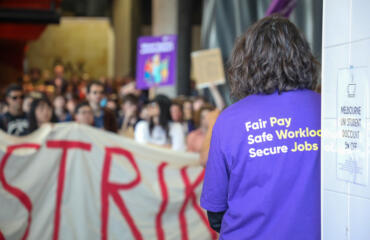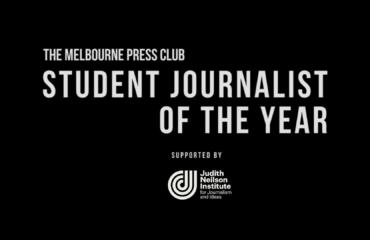It was no coincidence that Australia’s best known Indigenous journalist, Stan Grant, had “decided to abandon his exemplary career” at this defining moment in the country’s history, award-winning Indigenous filmmaker Rachel Perkins told a Melbourne forum this week.
With the looming vote on the Voice to Parliament, “Australians as a collective” were deciding “whether to recognise Aboriginal and Torres Strait Islanders in our Constitution”. The racialised abuse and threats that incited had forced Grant to confront the conflict hard wired into media discourse, ultimately concluding Australian media was not up to the moment, and he could not remain part of it.
“Every day, I am permeated with the media stench Stan describes,” said Perkins, who was delivering the prestigious annual A.N Smith Lecture in journalism at the University of Melbourne.
“I wake up thinking about it at night. I wade through the social media sewer in the day, in response to our positive messaging of hope, for a better life for our people.”

Responding to questions, Perkins said she understood “those who argue Treaty should be first”. But she argued the Voice and Treaty “were not mutually exclusive”. Photo: Jixiang Liu
Journalists would have a profound influence over the vote Australians would exercise in about seven weeks time, Perkins said. “To pretend otherwise is to deny our own intelligence … The consolidation of power in media ownership that works against Aboriginal and Torres Strait Islander peoples interests is something I’ve experienced throughout my life.
“This is not new. It [has] also defined our colonial history.”
She recalled that she had become a filmmaker through an opportunity that emerged in 1988 coming out of the Aboriginal self-determination movement, and reflected that she now saw growing representation of Indigenous Australians in journalism, giving special credit to the ABC for its work.
“Why is it important for us to have a role? Because the sweep of history tells us that the media and journalism has not served our people our cause.”
And while media coverage of the Voice to Parliament referendum was dominated by polarising public figures, the very people the Yes vote aimed to represent remained unheard.
“The media always goes to the high profile individuals. The media comes to me, for example, rather than goes to members of the Strong Grandmothers Group, in Alice Springs,” said Perkins.
“What we find is that people who don’t have a profile, that are community representatives, [that] are on the ground, do not have their voices heard, which is exactly why we want the Voice.”
Historically First Australians have looked to journalists for help to support their protest actions and educate Australians on the truth about the Australian Wars – the title of Perkins’ 2022 documentary series for SBS on the frontier conflicts that established the Australian nation.
“Truth is important, but it must be followed by action. Identifying the problem is only a start. The next question is what do we do? And this is why we need a Voice,” said Perkins, who is an Arrernte and Kalkadoon woman.
“We’re trying to find a way for people from regional and remote areas, who represent their communities, to have a say, to break through this impasse of not being heard.”
One example of giving a voice to regional communities could be found in the story of the Indigenous run and owned dialysis facility in Alice Springs. The Purple House renal dialysis facility transformed the lives of Indigenous patients with failing kidneys. Since the opening of this independent clinic in 2004, Central Australia has gone from having the worst to best survival rates for dialysis in Australia.
“I made this video about them, to show people that local people have solutions to their challenges. And if we had a Voice, you might hear some of these solutions from these people nationally,” said Perkins.
Questioned about opposition to the Voice from progressive No campaigners, who argue it is a weak and powerless proposal that undermines recognition of Blak sovereignty, Perkins said she understood the perspective of “those who argue Treaty should be first… Indigenous people have asked for a Treaty since the 1970s”.

Director of the Centre for Advancing Journalism, Dr Andrew Dodd, with 2023 A.N Smith orator Rachel Perkins. The lecture series, focusing on issues in journalism, dates back to 1936. Photo: Yan Bi
But she argued that the Voice and pursuit of Treaty were “different mechanisms – they’re not mutually exclusive. The question of Treaty is a longer term question.
“Treaty can be done anytime and it’s happening in progressive Victoria,” Perkins said. “It’s now five years into the Treaty process and they’ve just established the settlement which is fantastic.
“But the referendum is upon us literally now.”
Perkins said that the Voice coming first would assist the process of Treaty-making, and that “it will be there as an enduring part of our democracy so that if the government does get to a point of negotiating treaties, it will be there to hold the government to account”.
In the lead up to the referendum, journalists had a key role to play in delivering truth and clarity, Perkins says.
“The media will be a profound player in the outcome. So we have to clarify that we are not bringing race into the Constitution, [and] that we are not dividing the nation,
“People need to understand what’s being asked of them.”
A video of Rachel Perkins’ 2023 A.N Smith Oration is now available here.



